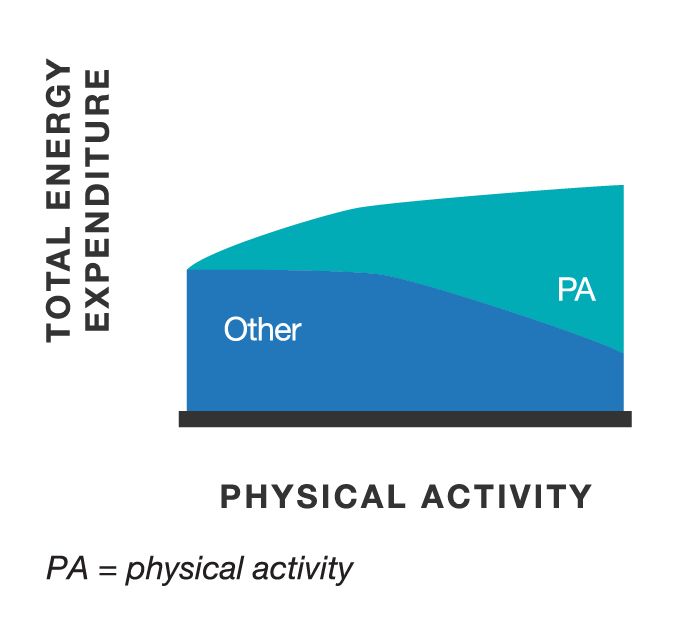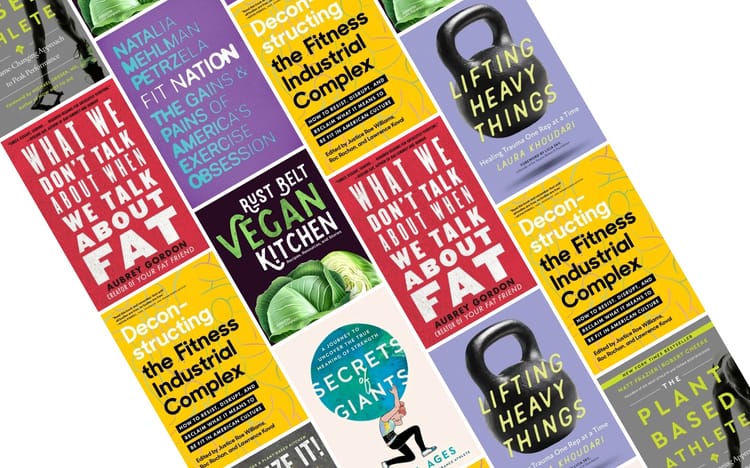Learning affirming alternatives to "dieting"


Almost everyone I know has wanted to lose weight by dieting at some point in their life — me included. There is constant social pressure for people, especially women, to lose weight, and as a result, most of us have a negative body image.
When I'm coaching someone, weight loss often comes up as a fitness goal. Most personal trainers promote weight-loss dieting as a fitness practice, but I do not. Therefore, this is not an article about how to diet. Instead, let's learn alternatives to trying to lose weight because the world makes us dislike our bodies.
Note of disclosure: I'm still learning from the fat liberation and Black liberation movements, and I'll point to their activists as the experts. As a thin, white man, I'm striving to use my privilege to subvert racism and anti-fatness in the fitness world.
If you would like to read from an writer who is part of those movements, Stephanie Yeboah wrote this excellent article about her personal relationship with her fat, Black body. I can also recommend the book What We Don't Talk About When We Talk About Fat by Aubrey Gordon.
Understanding "diet culture"
Dieting has become widely popular because of "diet culture." Diet culture is our society's system of beliefs based on valuing thinness rather than health or well-being. It influences our behaviors, especially our desire to lose weight, by creating a stigma around body weight. The concept of critiquing diet culture comes from fat, Black, queer, and feminist activists.
As explained by public health author Christy Harrison, diet culture disproportionately harms women and feminine people, transgender people, people in larger bodies, people of color, and people with disabilities — because they don't match up to society's dominant picture of "health."
Diet culture is a result of fatphobia (or anti-fat bias). Fatphobia is the status quo in medicine, and many doctors mistreat fat patients, resulting in harmful health inequities for fat people. The medical community's attempts to correlate Body Mass Index (BMI, a measurement that's based in racism, sexism, and nonsense) with diseases have not proven causations, and dieting is not a proven cure for any disease.
Diet culture causes us to:
- feel bad because we don’t look like the thin “ideal.”
- spend our time, energy, and money trying to lose weight to attain higher social status.
- be hyper-vigilant or ashamed about our eating instead of experiencing the pleasure and value of foods.
Within diet culture, fitness often takes on psychologically harmful forms, like working out to "burn off" a food or trying to "get ready for beach season."
Diet culture is fully integrated into capitalism. Humans eat to nourish our bodies and our minds, but the industrial food system is motivated by profit, not nourishment, says sociology professor Anthony Winson. And weight-loss corporations sell products or subscriptions by embracing diet culture rather than health outcomes.
Untangling our associations of health with thinness
Like other systemic forms of oppression, diet culture affects all of us, though it harms marginalized people disproportionately. We all, individually and collectively, benefit from countering diet culture by valuing health over thinness.
If you want to lose weight, here are some things to know.
Losing weight is hard and made harder by metabolic adaptation. When you eat less, your body naturally counteracts your rate of weight loss with changes in mitochondrial function, hormone levels, and energy expenditure. The adaptations vary between persons, so you can't compare your weight loss efforts with others, either.
Because of your body's responses, exercising is also not a guaranteed method for weight loss (even though there are many other benefits of exercise). According to the constrained energy expenditure model, exercises only cause about 20-50% of the weight loss you would expect based on their "calories burned" estimates. Exercising does burn calories, but if you increase your amount of physical activity without eating more, your body can decrease its other energy expenditures, like blood circulation, brain function, and cell growth, to compensate.

Even if you do lose weight, just being thin is not the same thing as being healthy. Researchers point to the "obesity paradox," in which populations defined by BMI as "obese" show lower rates of mortality. Thin people can suffer from malnutrition or eating disorders, of course. And thankfully, strength training can make you stronger regardless of your weight, as body fat levels do not affect muscle growth.
When we tell someone to just "go on a diet" to get "healthy," we're pushing them towards frustration or worse...
So if changing the size and weight of our bodies is so difficult, can we instead pursue fitness while accepting the bodies we already have? I say yes, because my definition of affirming fitness is not based on body size or weight:
"Body positivity" and "body neutrality"
Maybe this article is sounding like advice you've already heard: "Just love your body."
Body positivity is a social movement away from diet culture towards celebrating all bodies. But just search #bodypositivity on Instagram and you'll see the term has been co-opted by corporations and the conventionally attractive.
Arrested Development in 2005: "As a child, Maeby had been entered into a number of progressive pageants that claimed to celebrate beauty in all its forms. But the winners still tended to have it 'going on' in the conventional sense."
This essay by Emma Specter explains that the body positivity theory "emerged from the fat acceptance movement of the 1960s."
As the writer Amanda Mull argued in a 2018 op-ed for Vox, while body positivity used to be “just one element of an ideology that included public anti-discrimination protests and anti-capitalist advocacy against the diet industry,” over time it “shed its radical, practical goals in favor of an advocacy that’s entirely aesthetic and a problem that can be wholly solved by those looking to sell you something.”
Activists have criticized advertisers and influencers who post photos showing a single fat roll or sell "body-positive" underwear without inclusive sizing.
Capitalism packages body positivity as just another product, like diets, in its evolving "fatphobia" product line. If you can avoid that influence and love your body anyway, great! But if you're still struggling with body image, like me and most people, you may need some help.
A smaller step along the spectrum of body image is "body neutrality." Body neutrality is accepting that you live in the body you have, but your value is not based on that body's size or appearances.
To me, this is easier than always loving my body. It also aligns with advice from Mental Health America that has been useful for managing my depression and self-hatred:
Start by having compassion for yourself. Practice being kind to yourself. You don’t have to like someone to be nice to them. You also don’t have to like every single thing about yourself. Start by finding one or two small things that you do like about yourself, and spend more time thinking about those.
With body neutrality, I can appreciate the ways my body functions for me despite external messages or internal negativity. I've gotten better at not comparing my body to other bodies. In my fitness journey, I have occasionally felt love for my body for the way it moves during exercise or the way it feels when eating energizing foods.
Body neutrality also isn't selling us anything (yet).
An affirming fitness approach to your body
There is still tension between accepting your body and wanting to be fitter or more physically capable.
Adejoke Mason says in Them, "There may be things about our body we do want to change. We’re not doing anything wrong by acknowledging that fact, even if we also understand and recognize that systems of power may have informed that dissatisfaction."
I find this tension relieved somewhat by our lens of affirming fitness: the practice of believing in your unique body as strong and worthy of your care. Care can include fitness training.
When we pursue fitness with the goal of self-affirmation, we can adjust our thoughts about our body away from its appearance and towards its innate value. We can reframe negative thoughts, like "I look stupid when I run," into more positive ones, like "My body is moving with its own power, which is a privilege and a miracle of biology."
A similar framing works for me when making food choices, shaping positive thoughts like "I'm eating this because it will make my body feel great during my bike ride later." I'm not "earning" the food calories by riding my bike. I just love riding my bike, and certain foods makes that ride more enjoyable.
Rather than restrictive dieting for weight loss, often with limited success, choosing a more affirming fitness involves practices over which we have more control:
- Aim for loving your body, and when you can't, practice body neutrality. Your fitness journey is personal, so don't compare your body to others.
- Eat in ways that make you feel your best, physically and mentally. This requires trying a variety of foods and regularly observing your feelings.
- Find exercises you enjoy, and appreciate your body and meals for making them possible.
- If you set a goal of weight change, understand the inherent challenges, and remember your health and self-worth are not solely linked to your weight.
- If you choose to weigh yourself, pay attention to long-term trends rather than short-term fluctuations to reduce the emotional impact of the numbers. Don't worry about BMI or body fat percentages.
- Don't use calorie calculations as an exact science, and only monitor your calories if it helps you learn differences between foods.
These are examples of goals I'm comfortable setting and supporting with my clients. They fit into my harm-reduction approach to weight loss strategy. Together we can chip away at the diet culture we live in.
I truly believe fitness can be a validating journey to improve your body image, despite the misleading "ideal body" media within the fitness industry. It's a huge, personal victory just to believe in your body's strength, and when you do, you want to continue caring for that body for the experiences it provides you.
Unfortunately, dieting is not a useful method of caring for your body. Let's focus on practices that are. And together we can chip away at the diet culture we live in.





